ARTICLE AD BOX

 Facebook
Facebook
David Crisp sold his high-end perfume in Russia
A British businessman caught on camera confessing he was illegally selling luxury perfume to Russia is not facing criminal charges, the BBC has learned.
David Crisp admitted to an undercover investigator that he had “ignored government edicts” on sanctions by selling £1,000-a-bottle “Boadicea the Victorious” perfume in Russia.
The BBC can now exclusively show the undercover video, which has previously only been shared in court.
Mr Crisp was arrested in 2023 by HM Revenue and Customs (HMRC) - the UK government agency responsible for sanctions enforcement - but the investigation was dropped earlier this year. This is despite the discovery of evidence that he tried to conceal more than £1.7m of illegal sales.
Mr Crisp, from Surrey, denies knowingly breaching sanctions or concealing trades with Russia.
There has not been a single UK criminal conviction for violating trade sanctions on Russia, the BBC understands, since Moscow’s full-scale invasion of Ukraine almost three years ago.
Failing to punish violators is “a bad signal to send” and makes the UK look like a “soft touch,” says senior Conservative MP Sir Iain Duncan Smith, who has been calling for tougher action against Russia.
Undercover filming: David Crisp tells a private investigator how he sells perfume to Russia
Mr Crisp travelled the world selling high-end perfume, regularly rubbing shoulders with celebrities and VIPs, who were unaware of his activities in Russia.
But when he started chatting to a friendly American in the lift of a luxury hotel in Dallas in July last year, he had no idea he was actually speaking to a private investigator.
Posing as a Las Vegas businessman, the agent said he was interested in stocking Mr Crisp’s perfumes. They later met in Crisp’s hotel room to smell the fragrances - where the investigator secretly filmed the conversation.
“How’s your Russian market?” the investigator asked. “Don’t tell anyone.” Mr Crisp replied, “We’re doing really well… we ignore government edicts.”
After Russia’s full-scale invasion of Ukraine in February 2022, the UK government introduced sanctions banning trade with Russia in several areas - perfumes are specifically named. Breaching these regulations is a serious offence, with a maximum prison sentence of up to 10 years.
Following the introduction of sanctions, Mr Crisp had agreed with his then-business partner, David Garofalo, to cease trading with Russia. But Mr Garofalo later became suspicious after a whistleblower claimed that Crisp continued to sell perfume in Moscow. Mr Garofalo then hired the private investigators.
The undercover footage is “sickening” David Garofalo told me as we watch the footage together, adding “he knows that he’s violating the sanctions”.

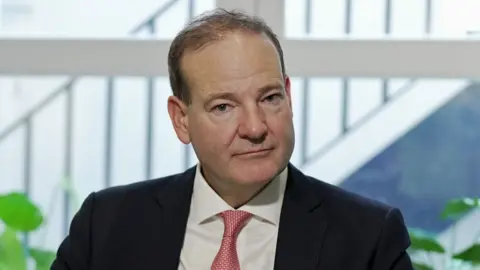
David Garofalo halted all sales to Russia once he took full control of the company
Without Mr Crisp’s knowledge, the company also compiled a dossier of evidence that he had knowingly violated sanctions.
Staff also found pallets of goods in the company’s UK facility with paperwork showing recipients in Russia, and international shipping data confirming deliveries. Products were discovered on sale in Moscow that the company had only launched after the imposition of sanctions.
“He had actually gone out of his way to disguise the fact that he’d continued selling to Russia,” Mr Garofalo told us. “He had deceived our in-house lawyer and misled our auditors.”
Mr Garofalo reported Mr Crisp to HMRC and it opened a criminal investigation. At the same time, Mr Garofalo pursued a civil case against his partner to remove him from the company.
In July this year, a High Court judge granted a rare provisional injunction, meaning Mr Crisp would be removed immediately pending the full civil trial.
In his ruling, the judge said the undercover video was “compelling evidence” that Mr Crisp knew he was breaching sanctions and the company accounts showed he “concealed the Russian trading”.
After taking full control of the company, Mr Garofalo immediately halted all sales to Russia.
In a statement, David Crisp told the BBC: “I strongly refute the allegations made against me by Mr Garofalo, at no point did I knowingly trade in breach of Russian sanctions… at no point did I attempt to conceal those trades… the companies' trades with Russia were well known to those within the business… I look forward to being fully exonerated.”

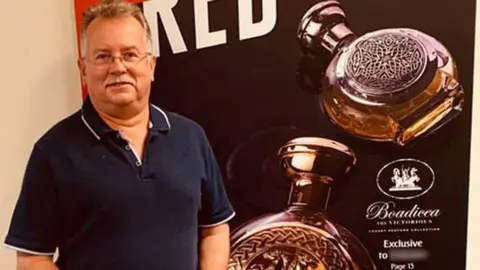 Facebook
Facebook
The perfume sold in Russia cost £1,000 a bottle
HMRC officers arrested Mr Crisp upon arrival at Gatwick Airport in October 2023 and seized his passport.
But, by July this year, HMRC had dropped its investigation and told Mr Crisp that it would take no further action against him, returning his passport.
Mr Garofalo told us he was shocked HMRC had showed no interest in the evidence he had collected. “It was an open and shut case. The evidence was just irrefutable.”
HMRC does not comment on individual cases, but it told the BBC that failure to comply with sanctions is a serious offence, and those who breach them could face enforcement actions including financial penalties or referral for criminal prosecution.
Its statement added: “HMRC has fined five companies for breaches of the Russia sanctions regulations in the last two years, including a £1m fine issued in August 2023.”
But the BBC understands there haven’t been any criminal prosecutions for violating trade sanctions on Russia since February 2022.

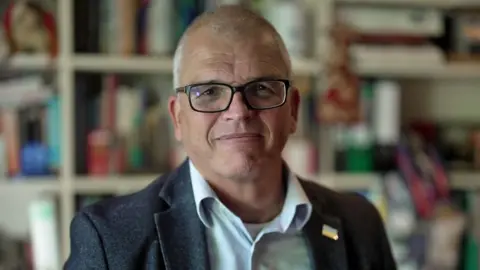
Tim Ash says the “allure of doing business with Russia... is too much for some people”
Sir Iain Duncan Smith MP, the chair of a committee of MPs working on sanctions against Russia, told the BBC the Crisp case isn’t a “one-off”.
“In terms of prosecution and seriously pursuing people over sanctions, the UK is very poor indeed,” said Sir Iain. “If we don't prosecute, who the hell is deterred from breaching sanctions?
He said other countries including the US, were “light years” ahead of the UK in terms of prosecuting violators.
“There needs to be arrest, prosecution and incarceration. And if we don't do that, then there's no such thing as sanctions.”
The former Conservative Party leader said that HMRC often reached settlements, instead of issuing large fines or criminal convictions.
“The authorities may say the sanctions breaches are too small to prosecute, but the answer is you prosecute the small ones, because the big ones need to know that you're coming after them as well,” he added.
The UK government had hoped sanctions would be a deterrent, without the need for robust enforcement, according to Tim Ash from the foreign affairs think tank Chatham House.
“The reality is, the allure of doing business with Russia, the huge profits to be made, are too much for some people,” explained Mr Ash.
“They’re more interested in their bottom line, as opposed to the bottomless pit of Ukrainians dying.”
He said cases like Mr Crisp’s sent a clear message that there would be no consequences for continuing business with Russia.
“We are almost three years into the [full-scale] invasion, and the fact that we haven't got our sanctions regime together is pretty extraordinary.”

 1 month ago
14
1 month ago
14

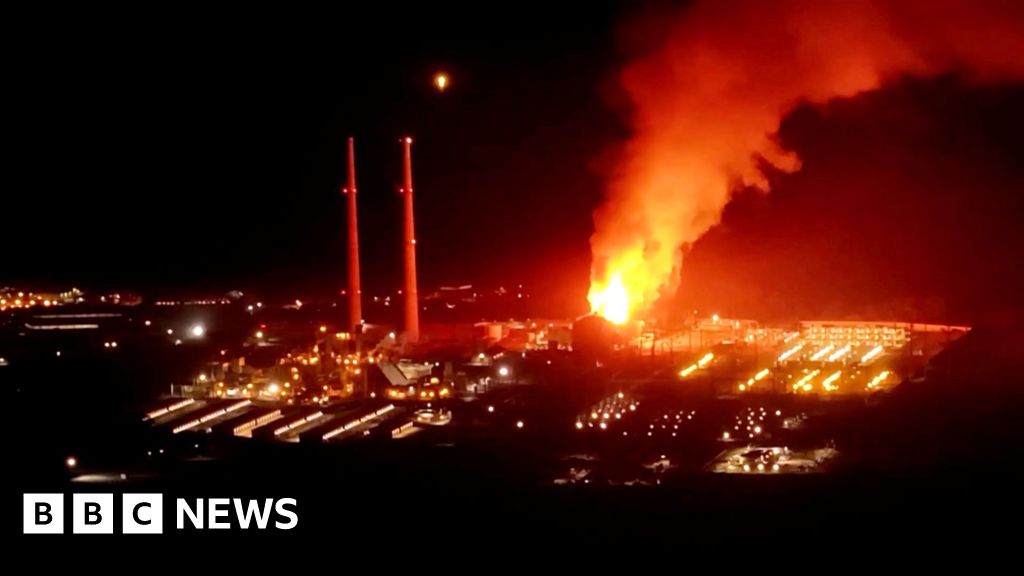
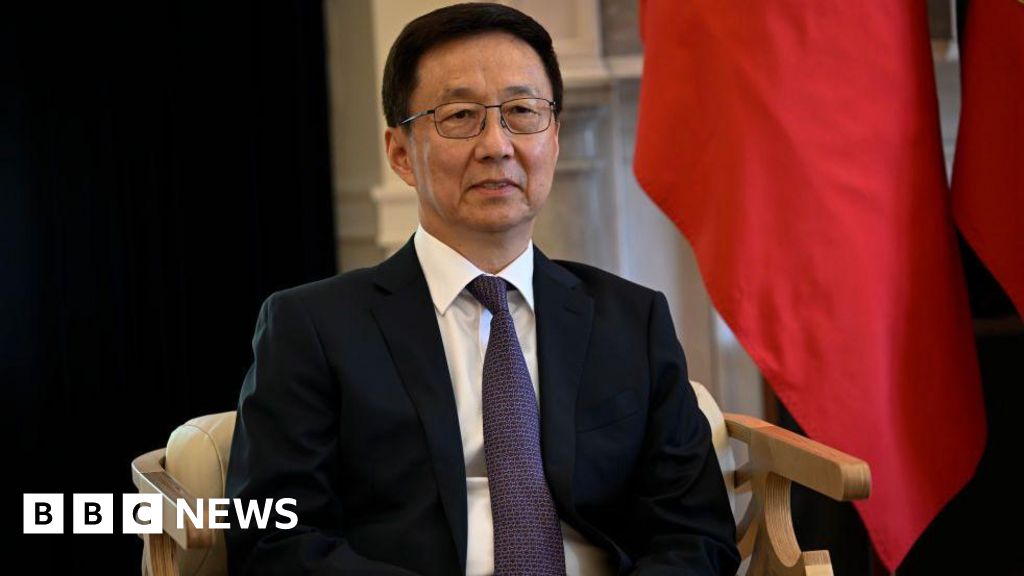





 English (US) ·
English (US) ·